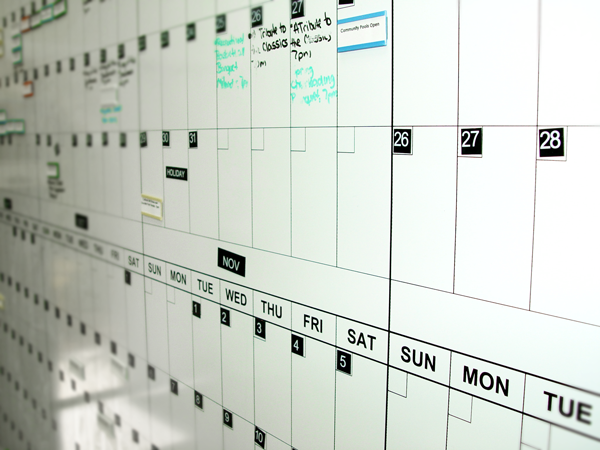Workplaces that Work: Effective Meetings by the HR Council of Canada
 Meetings are one of the most effective ways that people share and exchange information, get feedback, plan, collaborate and make important decisions for their organizations. This document presents practical ideas to improve the quality and effectiveness of meetings.
Meet regularly. Under stress of deadlines, regular meetings are often cancelled. Do the opposite! Bring people together, even for 15 minutes, to get them talking and problem solving together. It can be surprising how a quick meeting can help alleviate stress and re-energize the group.
Meetings are one of the most effective ways that people share and exchange information, get feedback, plan, collaborate and make important decisions for their organizations. This document presents practical ideas to improve the quality and effectiveness of meetings.
Meet regularly. Under stress of deadlines, regular meetings are often cancelled. Do the opposite! Bring people together, even for 15 minutes, to get them talking and problem solving together. It can be surprising how a quick meeting can help alleviate stress and re-energize the group.
Checklist for developing meeting agendas:
- Think of what overall outcome you want from the meeting and what activities need to occur to reach that outcome. The agenda should be organized so that these activities are conducted during the meeting.
- In the agenda, state the overall outcome that you want from the meeting.
- Next to each major topic, include the type of action needed, the type of output expected (decision, vote, action assigned to someone) and time estimates for addressing each topic.
- Don’t overly design meetings; be open to adapting the meeting agenda if members are making progress in the planning process.
- Think about how you frame an event so people come in with that mindset. It may pay to have a short discussion around the title to develop a common mindset among attendees.
- Of course, the most important part of creating an effective agenda is to follow it during the meeting!
Facilitating meetings: Facilitation is about process rather than content. Having an assigned facilitator during your meeting can help the group keep to its task while paying attention to the needs of each group member. If the same participants meet regularly, consider rotating roles so that everyone gets a chance to acquire and develop their meeting facilitation skills.
Five key elements to consider when facilitating meetings:
- Opening. Frame the meeting by reviewing the agenda and clarifying roles.
- Establishing ground rules. Establish a common agreement on how you will work together.
- Time management. Keep track of time to ensure all agenda items are covered and tasks are assigned.
- Evaluation of the meeting. Take 4-5 minutes to get feedback to improve meeting process. Follow up on these ideas for the next meeting.
- Closing. Clarify and review actions and commitment of participants.
Other key facilitation considerations:
- Keep things visible. Simply writing the agenda on a flip chart or white board keeps things public. Agenda handouts waste paper and often mean participants are looking down rather than looking and listening to one another.
- Make things clear by clarifying points, paraphrasing, synthesizing and confirming.
- Capture decisions made or next steps on the flip chart or white board. Everyone making their own notes can lead to confusion later if people heard different things.
- Be clear on what you are asking for: Clarification? A decision? An idea? Information sharing? Information seeking?
- Create space for all voices to be heard.
- Assign a note taker for the meeting if you want to capture notes from the meeting in addition to what is taken down on the white board or flip chart.
- Note: meetings don’t suit every personality type. It is easy for people with strong personalities to drown out others during a meeting. Some people need time to reflect on what they’ve heard – or absorb information better by reading the minutes of a meeting – and may have more to say after a meeting. Remember, not everyone has the same way of learning or interacting with others. Try to take these varying needs and styles into account.
Evaluating meetings. This can be a crucial and quick step to dramatically improve your meetings. Conduct a 5 minute check by asking what worked and what can be done differently next time (verbal or written). Don’t debate the answers.
- Note: When conducting an evaluation, be mindful to integrate the suggestions, decision and/or feedback into future meetings. People will stop providing feedback in meetings if they don’t see that their feedback is being considered or used.
Links & Resources
- Basic Guide to Conducting Effective Meetings: www.managementhelp.org/misc/mtgmgmnt.htm#anchor635206 www.effectivemeetings.com
- The Art of Facilitations: How to Create Group Synergy (Paperback) by Dale Hunter, Anne Bailey, and Bill Taylor (1995): An extensive training toolkit for facilitators.
- Running Board Meetings: How to Get the Most from Them, by Patrick Dunne (2007): Running and contributing to board meetings requires a lot of thought. This book provides a practical step-by-step on every issue pertaining to board meetings and is organized in a ‘Before’ ‘During’ and ‘After’ structure.
Find more information at: http://www.hrcouncil.ca/hr-toolkit/workplaces-meetings.cfm
